Martin Cosby's Blog, page 8
June 12, 2013
Review: Rope Trick by Mark P. Henderson
Rope Trick: Thirteen Strange Tales
was published a few years ago, by Ash-Tree Press, and came from an author not previously known for fiction. I was tempted to try this collection after hearing the short story Rope Trick itself being described as 'Aickmanesque'; and, having included this tale in my top ten stories I have read so far this year, I decided to re-read the whole book.
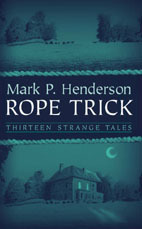
These are elegantly written, genuinely creepy stories in modern settings. As the author himself says in his introduction, there is '... no hint of sinister history, not a creaking door or tomb or mysterious figure in sight, no threat of mortal extinction, and unbroken holiday weather throughout'.
An Incident in Drereton kicks everything off, and sets the tone. In a mundane English market town, retiree Tom experiences what seems like a strange vision from the past, which, despite its brevity, affects him deeply. He unearths an incident from the past, and, rather than clearing things up, it poses a more significant question. Crooker is a fascinating blend of folk tales, pieced together to create a compelling story with an authentic sense of impending doom. It is written in a different style to the other tales in this collection, and mixes things up straight away. By way of contrast, East Norham is more of a ghost story in the usual sense. Tony Lomax is some kind of psychic investigator, and is called upon to investigate the strange happenings in a house rented by some friends. It would seem to be a case of poltergeists; and, as the story twists and turns, the past collides with the present in a most unpleasant way, and winds up to a satisfyingly ambiguous conclusion.
The breadth of this collection, and the author's skill, is highlighted by the next tale, De Profundis. It is quite unlike its predecessors. Set in some arid outback desert, a mute, pregnant woman appears from the heat haze, and farmer MacGregor takes it upon himself to look after her. However, things do not go to plan; in fact, things go in entirely the opposite direction. I won't spoil the shocking end of this story, but suffice to say it is not ambiguous at all!
Next up is Rope Trip itself. A group of friends suffer a breakdown of the mechanical kind while on a driving holiday, and are forced to find solace in a large, solitary house. Were they somehow expected? Their travails when attempting to leave, and subsequent strange disappearances, add up to a supremely atmospheric tale which wrong-foots the reader at every turn. The title of The Well Dresser is a play on words that does not perhaps do the story justice. This is another tale which seems to draw from local legend or folk tale, and draws the reader into the village politics and prejudices of a previous age. Do you believe in the old wives' tales?
Period Instruments is a perfectly-formed tale of poignant memories, and a highlight of this collection. The protagonist is recalling a visit to The William Marshall Collection of Antique Musical Instruments, in the backstreets of an idyllic seaside town, when he was 'approaching his fourteenth birthday'. His magical encounters with the various instruments, especially the clavichord, is both elegantly written and thought-provoking; and William Marshall himself is touchingly portrayed. Following this, the tone is lightened somewhat by Disappearing Act, which is a brief reminiscence with a very apt title; but I won't spoil the story for you.
Return Ticket is an intriguing tale of a journey David takes on public transport. He finds an old copy of a novel on the seat beside him on a train, which he subsequently finds has rather more significance than he imagines. Handicapped by only having the haziest recollection of his past, he discovers more than he is comfortable with; and the reader is taken along for the rollercoaster ride. I must admit, I'd very much like to see what else the Cobham Circulating Library has for loan!
Writing with a regional accent is always hard to pull off, and can make or break a story; in Ticking, the author has portrayed Scottish well, adding to the atmosphere. Peter and Jock are looking to make a delivery from their articulated lorry on a foggy November night, but get lost and are thwarted by a narrow lane. They seek shelter in what seems to be some kind of monastery, with the sound of ticking reverberating throughout, despite there being no clocks. Their subsequent discovery about the area, and Jock's ultimate fate, make them question their recollection of the mysterious events.
I'm not usually one for werewolf tales, but Rome Will Rise Again is the best I've read for some time, combining jealousy and doomed relationships with a sense of foreboding and, ultimately, horror. The clashes between Ilia and Lucrezia add a convincing psychological interest. Genius Loci is the touching tale of a young boy who grows up to learn of the protective spirit resident within Nathan's Wood. 'Everything around him, the blade of grass and the beetle crawling along it, the rowan and birch, with their perfect branches and perfect leaves, the far hills and the creamy white cumulus, glowed with their own inner light.' Unwisely, in later life, he takes this wife to visit the wood, and her cynical view of the place brings about a terrible retribution. This is an evocative tale of the power existing in the depths of the English countryside; and perhaps the English psyche.
Rope Trick: Thirteen Strange Tales concludes with What Became of April, which is novella length. It deals with the disappearance, lasting three weeks, of a girl on her 19th birthday. Her changed demeanor upon return, being terrified of any modern aspect of life, suggests a kind of transfer has taken place between two time frames. It's an ambitious end to the book, and gives food for thought. My only reservation is that it could have been more concise; some of the focus present in the other stories was not present, and I found myself feeling it lost direction a bit. For me this was the difference between four and five stars for this excellent collection.
Overall, this is a beautifully written set of strange stories that deserves to be better known. I have no idea if Mark P. Henderson will write more in this vein; but I very much hope so.

These are elegantly written, genuinely creepy stories in modern settings. As the author himself says in his introduction, there is '... no hint of sinister history, not a creaking door or tomb or mysterious figure in sight, no threat of mortal extinction, and unbroken holiday weather throughout'.
An Incident in Drereton kicks everything off, and sets the tone. In a mundane English market town, retiree Tom experiences what seems like a strange vision from the past, which, despite its brevity, affects him deeply. He unearths an incident from the past, and, rather than clearing things up, it poses a more significant question. Crooker is a fascinating blend of folk tales, pieced together to create a compelling story with an authentic sense of impending doom. It is written in a different style to the other tales in this collection, and mixes things up straight away. By way of contrast, East Norham is more of a ghost story in the usual sense. Tony Lomax is some kind of psychic investigator, and is called upon to investigate the strange happenings in a house rented by some friends. It would seem to be a case of poltergeists; and, as the story twists and turns, the past collides with the present in a most unpleasant way, and winds up to a satisfyingly ambiguous conclusion.
The breadth of this collection, and the author's skill, is highlighted by the next tale, De Profundis. It is quite unlike its predecessors. Set in some arid outback desert, a mute, pregnant woman appears from the heat haze, and farmer MacGregor takes it upon himself to look after her. However, things do not go to plan; in fact, things go in entirely the opposite direction. I won't spoil the shocking end of this story, but suffice to say it is not ambiguous at all!
Next up is Rope Trip itself. A group of friends suffer a breakdown of the mechanical kind while on a driving holiday, and are forced to find solace in a large, solitary house. Were they somehow expected? Their travails when attempting to leave, and subsequent strange disappearances, add up to a supremely atmospheric tale which wrong-foots the reader at every turn. The title of The Well Dresser is a play on words that does not perhaps do the story justice. This is another tale which seems to draw from local legend or folk tale, and draws the reader into the village politics and prejudices of a previous age. Do you believe in the old wives' tales?
Period Instruments is a perfectly-formed tale of poignant memories, and a highlight of this collection. The protagonist is recalling a visit to The William Marshall Collection of Antique Musical Instruments, in the backstreets of an idyllic seaside town, when he was 'approaching his fourteenth birthday'. His magical encounters with the various instruments, especially the clavichord, is both elegantly written and thought-provoking; and William Marshall himself is touchingly portrayed. Following this, the tone is lightened somewhat by Disappearing Act, which is a brief reminiscence with a very apt title; but I won't spoil the story for you.
Return Ticket is an intriguing tale of a journey David takes on public transport. He finds an old copy of a novel on the seat beside him on a train, which he subsequently finds has rather more significance than he imagines. Handicapped by only having the haziest recollection of his past, he discovers more than he is comfortable with; and the reader is taken along for the rollercoaster ride. I must admit, I'd very much like to see what else the Cobham Circulating Library has for loan!
Writing with a regional accent is always hard to pull off, and can make or break a story; in Ticking, the author has portrayed Scottish well, adding to the atmosphere. Peter and Jock are looking to make a delivery from their articulated lorry on a foggy November night, but get lost and are thwarted by a narrow lane. They seek shelter in what seems to be some kind of monastery, with the sound of ticking reverberating throughout, despite there being no clocks. Their subsequent discovery about the area, and Jock's ultimate fate, make them question their recollection of the mysterious events.
I'm not usually one for werewolf tales, but Rome Will Rise Again is the best I've read for some time, combining jealousy and doomed relationships with a sense of foreboding and, ultimately, horror. The clashes between Ilia and Lucrezia add a convincing psychological interest. Genius Loci is the touching tale of a young boy who grows up to learn of the protective spirit resident within Nathan's Wood. 'Everything around him, the blade of grass and the beetle crawling along it, the rowan and birch, with their perfect branches and perfect leaves, the far hills and the creamy white cumulus, glowed with their own inner light.' Unwisely, in later life, he takes this wife to visit the wood, and her cynical view of the place brings about a terrible retribution. This is an evocative tale of the power existing in the depths of the English countryside; and perhaps the English psyche.
Rope Trick: Thirteen Strange Tales concludes with What Became of April, which is novella length. It deals with the disappearance, lasting three weeks, of a girl on her 19th birthday. Her changed demeanor upon return, being terrified of any modern aspect of life, suggests a kind of transfer has taken place between two time frames. It's an ambitious end to the book, and gives food for thought. My only reservation is that it could have been more concise; some of the focus present in the other stories was not present, and I found myself feeling it lost direction a bit. For me this was the difference between four and five stars for this excellent collection.
Overall, this is a beautifully written set of strange stories that deserves to be better known. I have no idea if Mark P. Henderson will write more in this vein; but I very much hope so.
Published on June 12, 2013 00:18
June 1, 2013
Top ten short stories of the year so far
I couldn't let short story month slip by without mention. (OK, I admit I knew nothing about it until this morning ... and, technically, it's not May any more ... but never mind that.) So I thought I should put together my top ten short stories of the year so far to mark the occasion. That is, not necessarily stories that were written or published this year, but ones that were new to me.
It's been an excellent year so far, and I've enjoyed so many short stories. So, in no particular order, here's my top ten.
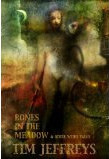 1.
Bones in the Meadow
by Tim Jeffreys. From
Bones in the Meadow and other weird tales
.
1.
Bones in the Meadow
by Tim Jeffreys. From
Bones in the Meadow and other weird tales
.
I first read this in the anthology What Fears Become, before buying the author's collection itself, which I have not yet read. I was sucked into this strange tale, captured by its sense of unease. Jim is a youth embarking on a camping trip with two traveling companions, Ste and Kelvin. It seems, as they make the transition by train from normality to an abstract, fog-bound landscape, that Jim is being coerced by his more worldly-wise friends. '"Guys, I think the town is that way." "Town!" said Ste with a laugh. "We're not going to town, Jim. We came to get away from everything, didn't we? We came here to get lost."' However, once Ste finds a skull in a nearby field, being lost loses some of its attraction; and it seems they are just as helpless as he is. Can Jim resist the lure of the mysterious girl tempting him to confront his deepest fears? I found this to be one of those stories I'm compelled to go back and read again, and I am eagerly anticipating the rest of Tim's collection.
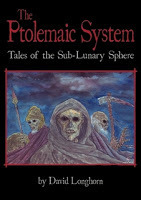 2.
Skirmish
by David Longhorn. From
The Ptolemaic System
.
2.
Skirmish
by David Longhorn. From
The Ptolemaic System
.
I have previously mentioned that I am a fan of David's Supernatural Tales short story collections, and that I enjoyed his collection The Ptolemaic System. This tale of morale-building manoeuvres "in a wooded valley in Northumberland on a drizzly August weekend" explores what happens when office workers on a team-building exercise collide with the past. Bill and Tracy, straying from the war games they have no interest in, become involved in a deadly hunt. Or do they? The mixture of the banal and the fantastic, and the ancient and modern, made this story stand out for me; and the ending intrigues.
 3.
The Remover of Obstacles
by James Brogden. From
Urban Occult
.
3.
The Remover of Obstacles
by James Brogden. From
Urban Occult
.
Terry Grainger has all sorts of bother picking up his car after obtaining an MoT. He is led on a less than merry chase from one seedy establishment to the next, in a spiral of confusion, through a bleak industrial landscape. His increasing disorientation and ultimate 'priority fast-tracked' fate combine to create a Kafka-esque roller-coaster ride which I found to be quite compelling.
4. Elevator by Adam Millard. From Urban Occult .
Also from Urban Occult, this is just my kind of tale. The setting, a bleak high-rise block of flats within a concrete wasteland, rings so true to me; and Sean is the perfect anti-hero. His chance meeting on the stairs sets the scene apparently to go in one direction, but things get turned around in the most shocking way. Elevator is full of brooding, threatening atmosphere, but the real danger approaches from an unexpected source. The scene involving Dennis and his mother in their insalubrious flat will stay with me for a long time, and more than makes up for the ending; which I found perhaps a tad conventional.
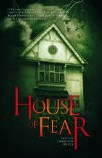 5.
Inside/Out
by Nicholas Royle. From
House of Fear
.
5.
Inside/Out
by Nicholas Royle. From
House of Fear
.
I'm a big fan of Nicholas Royle, ever since I read his remarkable tale of urban alienation Archway many years back. House of Fear is an excellent anthology, and this story is one of the best of a good bunch. In this deceptively complex tale, Japanese sensibilities collide with a prosaic north London setting, creating an austere atmosphere. The house, with its conflicting entrances and labyrinthine layout, serves as a great analogy for the confusion within the protagonist's mind. This story reminded me a little of Laura by Robert Aickman. Which is something of a recommendation!
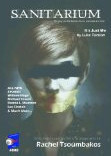 6.
Mirages in the Badlands
by James Everington. From
Sanitarium #008
.
6.
Mirages in the Badlands
by James Everington. From
Sanitarium #008
.
It's always interesting to read a good writer's interpretation of an unfamiliar genre. I suppose it could be said that this is a zombie story; which would not normally interest me. However, I soon found out that foremost it is a James Everington story. That is, written from his usual slightly skewed perspective, and therefore gripping from beginning to end. The relationship between the unfortunate Chavez and his two captors is convincingly told, and the change of perspective at the end will make you think. The best zombie story I have come across by far.
7. The Engineer by David Haynes. From Ballet of the Bones .
The Engineer is a short story from Ballet of the Bones, part of David Haynes's collection of Victorian-style penny dreadfuls, including Mask of the Macabre and Seance of the Souls. The titular engineer's career develops from repairing sewing machines to something decidedly macabre, prompted by the unexpected visit from a badly injured officer of the Crimean war. The engineer's quest for perfection leads to murder, and subsequently to his unsuspecting part in a grisly sideshow. The story is told with authentic atmosphere and an impressive sense of impending doom. Enter at your own risk.
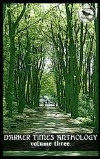 8.
A Tale of Chirbury
by PJ Hodge. From the
Darker Times Anthology Vol 3
.
8.
A Tale of Chirbury
by PJ Hodge. From the
Darker Times Anthology Vol 3
.
For me, PJ Hodge's blog, Freaky Folk Tales, has been one of the finds of the year thus far. His thoroughly researched and well-written (in the style of MR James) accounts of local folklore from around the British Isles are quite compelling. His output is prodigious, and certainly deserves to be compiled in print; so I was pleased to see A Tale of Chirbury included in the Darker Times Anthology Vol 3, following on from my own story, Abraham's Bosom. I won't spoil the story, but this tale of supernatural happenings in the little village of Chirbury, and its gateway to the past, will intrigue you; and you'll soom be a regular visitor to the Freaky Folk Tales blog, just like me!
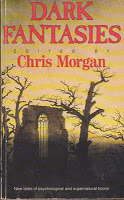 9.
Three Degrees Over
by Brian Aldiss. From Dark Fantasies.
9.
Three Degrees Over
by Brian Aldiss. From Dark Fantasies.
This is an oldie but a goodie, from the anthology Dark Fantasies, which is long out of print but well worth looking out for; I rediscovered it on my bookshelf recently. Brian Aldiss is of course a very accomplished writer, and Three Degrees Over is something of a tour de force among the many strange stories I have read. Alice Maynard is returning by 'plane from the US to her settled and mundane life among the spires of Oxford. However, on the flight, she finds herself seated next to Felicity Paiva, an American who somehow imposes herself upon Alice's hospitality. Her baffling effect upon Alice's previously reserved husband Harold, with its heavy undercurrents of passion, sets the scene for a literally fantastic conclusion which has to be read to be believed.
 10.
Rope Trick
by Mark P. Henderson. From
Rope Trick: Thirteen Strange Tales
.
10.
Rope Trick
by Mark P. Henderson. From
Rope Trick: Thirteen Strange Tales
.
This is a great story, and has been called 'Aickmanesque', which is what attracted me to Mark P. Henderson's work in the first place. Well, I must say it is not in fact 'Aickmanesque'; however, it does not need to be. It stands very well in its own right. A group of friends suffer a breakdown of the mechanical kind while on a driving holiday, and are forced to find solace in a large, solitary house. Were they somehow expected? Their travails when attempting to leave, and subsequent strange disappearances, add up to a supremely atmospheric tale which wrong-foots the reader at every turn (and, most importantly, the ending is great). This is a good example of the author's work, all of which I have enjoyed.
It's been an excellent year so far, and I've enjoyed so many short stories. So, in no particular order, here's my top ten.
 1.
Bones in the Meadow
by Tim Jeffreys. From
Bones in the Meadow and other weird tales
.
1.
Bones in the Meadow
by Tim Jeffreys. From
Bones in the Meadow and other weird tales
.I first read this in the anthology What Fears Become, before buying the author's collection itself, which I have not yet read. I was sucked into this strange tale, captured by its sense of unease. Jim is a youth embarking on a camping trip with two traveling companions, Ste and Kelvin. It seems, as they make the transition by train from normality to an abstract, fog-bound landscape, that Jim is being coerced by his more worldly-wise friends. '"Guys, I think the town is that way." "Town!" said Ste with a laugh. "We're not going to town, Jim. We came to get away from everything, didn't we? We came here to get lost."' However, once Ste finds a skull in a nearby field, being lost loses some of its attraction; and it seems they are just as helpless as he is. Can Jim resist the lure of the mysterious girl tempting him to confront his deepest fears? I found this to be one of those stories I'm compelled to go back and read again, and I am eagerly anticipating the rest of Tim's collection.
 2.
Skirmish
by David Longhorn. From
The Ptolemaic System
.
2.
Skirmish
by David Longhorn. From
The Ptolemaic System
.I have previously mentioned that I am a fan of David's Supernatural Tales short story collections, and that I enjoyed his collection The Ptolemaic System. This tale of morale-building manoeuvres "in a wooded valley in Northumberland on a drizzly August weekend" explores what happens when office workers on a team-building exercise collide with the past. Bill and Tracy, straying from the war games they have no interest in, become involved in a deadly hunt. Or do they? The mixture of the banal and the fantastic, and the ancient and modern, made this story stand out for me; and the ending intrigues.
 3.
The Remover of Obstacles
by James Brogden. From
Urban Occult
.
3.
The Remover of Obstacles
by James Brogden. From
Urban Occult
.Terry Grainger has all sorts of bother picking up his car after obtaining an MoT. He is led on a less than merry chase from one seedy establishment to the next, in a spiral of confusion, through a bleak industrial landscape. His increasing disorientation and ultimate 'priority fast-tracked' fate combine to create a Kafka-esque roller-coaster ride which I found to be quite compelling.
4. Elevator by Adam Millard. From Urban Occult .
Also from Urban Occult, this is just my kind of tale. The setting, a bleak high-rise block of flats within a concrete wasteland, rings so true to me; and Sean is the perfect anti-hero. His chance meeting on the stairs sets the scene apparently to go in one direction, but things get turned around in the most shocking way. Elevator is full of brooding, threatening atmosphere, but the real danger approaches from an unexpected source. The scene involving Dennis and his mother in their insalubrious flat will stay with me for a long time, and more than makes up for the ending; which I found perhaps a tad conventional.
 5.
Inside/Out
by Nicholas Royle. From
House of Fear
.
5.
Inside/Out
by Nicholas Royle. From
House of Fear
.I'm a big fan of Nicholas Royle, ever since I read his remarkable tale of urban alienation Archway many years back. House of Fear is an excellent anthology, and this story is one of the best of a good bunch. In this deceptively complex tale, Japanese sensibilities collide with a prosaic north London setting, creating an austere atmosphere. The house, with its conflicting entrances and labyrinthine layout, serves as a great analogy for the confusion within the protagonist's mind. This story reminded me a little of Laura by Robert Aickman. Which is something of a recommendation!
 6.
Mirages in the Badlands
by James Everington. From
Sanitarium #008
.
6.
Mirages in the Badlands
by James Everington. From
Sanitarium #008
.It's always interesting to read a good writer's interpretation of an unfamiliar genre. I suppose it could be said that this is a zombie story; which would not normally interest me. However, I soon found out that foremost it is a James Everington story. That is, written from his usual slightly skewed perspective, and therefore gripping from beginning to end. The relationship between the unfortunate Chavez and his two captors is convincingly told, and the change of perspective at the end will make you think. The best zombie story I have come across by far.
7. The Engineer by David Haynes. From Ballet of the Bones .
The Engineer is a short story from Ballet of the Bones, part of David Haynes's collection of Victorian-style penny dreadfuls, including Mask of the Macabre and Seance of the Souls. The titular engineer's career develops from repairing sewing machines to something decidedly macabre, prompted by the unexpected visit from a badly injured officer of the Crimean war. The engineer's quest for perfection leads to murder, and subsequently to his unsuspecting part in a grisly sideshow. The story is told with authentic atmosphere and an impressive sense of impending doom. Enter at your own risk.
 8.
A Tale of Chirbury
by PJ Hodge. From the
Darker Times Anthology Vol 3
.
8.
A Tale of Chirbury
by PJ Hodge. From the
Darker Times Anthology Vol 3
.For me, PJ Hodge's blog, Freaky Folk Tales, has been one of the finds of the year thus far. His thoroughly researched and well-written (in the style of MR James) accounts of local folklore from around the British Isles are quite compelling. His output is prodigious, and certainly deserves to be compiled in print; so I was pleased to see A Tale of Chirbury included in the Darker Times Anthology Vol 3, following on from my own story, Abraham's Bosom. I won't spoil the story, but this tale of supernatural happenings in the little village of Chirbury, and its gateway to the past, will intrigue you; and you'll soom be a regular visitor to the Freaky Folk Tales blog, just like me!
 9.
Three Degrees Over
by Brian Aldiss. From Dark Fantasies.
9.
Three Degrees Over
by Brian Aldiss. From Dark Fantasies.This is an oldie but a goodie, from the anthology Dark Fantasies, which is long out of print but well worth looking out for; I rediscovered it on my bookshelf recently. Brian Aldiss is of course a very accomplished writer, and Three Degrees Over is something of a tour de force among the many strange stories I have read. Alice Maynard is returning by 'plane from the US to her settled and mundane life among the spires of Oxford. However, on the flight, she finds herself seated next to Felicity Paiva, an American who somehow imposes herself upon Alice's hospitality. Her baffling effect upon Alice's previously reserved husband Harold, with its heavy undercurrents of passion, sets the scene for a literally fantastic conclusion which has to be read to be believed.
 10.
Rope Trick
by Mark P. Henderson. From
Rope Trick: Thirteen Strange Tales
.
10.
Rope Trick
by Mark P. Henderson. From
Rope Trick: Thirteen Strange Tales
.This is a great story, and has been called 'Aickmanesque', which is what attracted me to Mark P. Henderson's work in the first place. Well, I must say it is not in fact 'Aickmanesque'; however, it does not need to be. It stands very well in its own right. A group of friends suffer a breakdown of the mechanical kind while on a driving holiday, and are forced to find solace in a large, solitary house. Were they somehow expected? Their travails when attempting to leave, and subsequent strange disappearances, add up to a supremely atmospheric tale which wrong-foots the reader at every turn (and, most importantly, the ending is great). This is a good example of the author's work, all of which I have enjoyed.
Published on June 01, 2013 02:06
May 23, 2013
Perfect penny dreadfuls
I've been immersed (or should I say shrouded) in Victorian gothic recently. I was tempted to try Mask of the Macabre, a collection of four short stories by David Haynes, and became hooked. This led me to his second collection of tales, Ballet of the Bones. Just as I was regaining my breath from that one, I found out there was a novella called Seance of the Souls. I must point out that the author has done a very clever thing; it is quite possible to enjoy any of these books individually, in any order ... yet taken together, and in sequence, they tell a story which will keep you on the edge of your reading chair (perhaps your mind?) until the very last page.
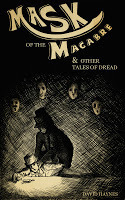
Mask of the Macabre sets the scene for your journey to the sordidly time-worn and foggy streets of Victorian London. You will soon wonder at the magician's grisly sleight of hand, and be shocked by the change of scene taking you within the walls of the Bethlem lunatic asylum. Then, the photographer's hideous job will make you wonder at the evil within human nature; depositing you, finally, with the entertainer – looking to expand his gruesome repertoire. If you are not too shell-shocked by now, you are welcome to experience ...
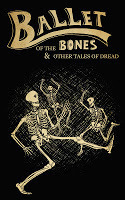
... the Ballet of the Bones! Will you appreciate the hideous displays in The Gallery of Wax? If so, you will be ushered into The Bone House, to experience first hand the bare bones of the gravedigger's existence. You will then meet The Engineer, who will astound you with his baroque, intricate creations, operating with the strange grace of precision; yet somehow quite wrong. And finally, with an impending sense of doom, the Director will prepare you for the final curtain. Good luck!
Perhaps, though, you may not be able to make your escape quite yet. You will be drawn, almost against your will, into the swirling, misty alleyways of the past once more, to experience the Seance of the Souls. With a growing sense of unease, you'll recognise some of the hideous characters from your previous travails.
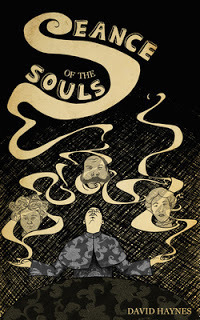
Beginning with a funeral where Matthew Napier is confronting the loss of his family, you will stumble through bloodstained gutters once more to witness a fortune teller giving him and his sister a bleak reading indeed. Once Matthew's sister is ripped from him too, his despair is complete; and he is vulnerable to the advances of pure evil. This is embodied by members of a spiritualist church, and he is confronted by the past in ways even you, dear reader, could not imagine. Is it magic, or murder? Who can Matthew trust? Amid corpses, skulls and ever-shifting masks, you will not know which way to turn. Be sure to keep your own senses sharp as those around you descend into madness!

Mask of the Macabre sets the scene for your journey to the sordidly time-worn and foggy streets of Victorian London. You will soon wonder at the magician's grisly sleight of hand, and be shocked by the change of scene taking you within the walls of the Bethlem lunatic asylum. Then, the photographer's hideous job will make you wonder at the evil within human nature; depositing you, finally, with the entertainer – looking to expand his gruesome repertoire. If you are not too shell-shocked by now, you are welcome to experience ...

... the Ballet of the Bones! Will you appreciate the hideous displays in The Gallery of Wax? If so, you will be ushered into The Bone House, to experience first hand the bare bones of the gravedigger's existence. You will then meet The Engineer, who will astound you with his baroque, intricate creations, operating with the strange grace of precision; yet somehow quite wrong. And finally, with an impending sense of doom, the Director will prepare you for the final curtain. Good luck!
Perhaps, though, you may not be able to make your escape quite yet. You will be drawn, almost against your will, into the swirling, misty alleyways of the past once more, to experience the Seance of the Souls. With a growing sense of unease, you'll recognise some of the hideous characters from your previous travails.

Beginning with a funeral where Matthew Napier is confronting the loss of his family, you will stumble through bloodstained gutters once more to witness a fortune teller giving him and his sister a bleak reading indeed. Once Matthew's sister is ripped from him too, his despair is complete; and he is vulnerable to the advances of pure evil. This is embodied by members of a spiritualist church, and he is confronted by the past in ways even you, dear reader, could not imagine. Is it magic, or murder? Who can Matthew trust? Amid corpses, skulls and ever-shifting masks, you will not know which way to turn. Be sure to keep your own senses sharp as those around you descend into madness!
Published on May 23, 2013 05:20
May 17, 2013
Mask of the Macabre and Ballet of the Bones
I have just discovered the work of David Haynes, and have thoroughly enjoyed his two collections of short stories,
Mask of the Macabre
and
Ballet of the Bones
.
Firstly I must say I was tempted to try them due to their excellent, quirky covers. As a graphic designer myself, I appreciate the visual side of the equation when it comes to publishing, and these really stand out. Not only are they that bit different, but they suit very well the content and style of the books.
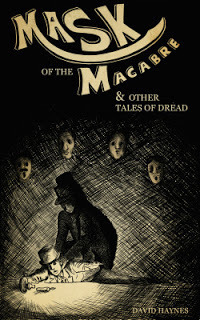
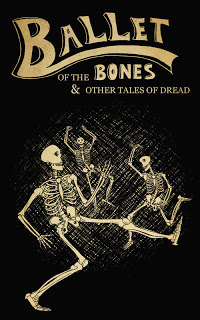
As for the tales themselves, well, I may very well do a review soon (and also of his new novella, Seance of the Souls), but in the meantime I hope Mr Haynes would not mind me reproducing the blurb he has provided on his website:
Mask of the Macabre
Four short tales of Victorian terror, each bound to the other by a chilling thread. The date is January 10th 1866 and the snow is falling thick on the blood soaked streets of a murderous London…
Mask of The Macabre: A travelling magician appears with a gruesome show. But what secret does it hide?
Doctor Harvey: Bethlem lunatic asylum’s newest patient has a story to tell, but how will he tell it to his doctor?
Memento Mori: A photographer is given a mysterious assignment with disturbing consequences.
The New Costume: The entertainer discovers a new string to his bow and gives the finest performance of his career.
Ballet of the Bones
Four short tales of Victorian terror, each bound to the other by a chilling thread. London suffocates under the festering reek of its bursting graveyards.
Ballet of the Bones: The curtain goes up on the greatest show on earth, but is everything all it seems?
The Bone House: The grave digger reflects on his morbid life, but what does his future hold?
The Engineer: His creations are beautiful, intricate and for a discerning palate.
Encore: The director makes ready for the end of the show.
Firstly I must say I was tempted to try them due to their excellent, quirky covers. As a graphic designer myself, I appreciate the visual side of the equation when it comes to publishing, and these really stand out. Not only are they that bit different, but they suit very well the content and style of the books.


As for the tales themselves, well, I may very well do a review soon (and also of his new novella, Seance of the Souls), but in the meantime I hope Mr Haynes would not mind me reproducing the blurb he has provided on his website:
Mask of the Macabre
Four short tales of Victorian terror, each bound to the other by a chilling thread. The date is January 10th 1866 and the snow is falling thick on the blood soaked streets of a murderous London…
Mask of The Macabre: A travelling magician appears with a gruesome show. But what secret does it hide?
Doctor Harvey: Bethlem lunatic asylum’s newest patient has a story to tell, but how will he tell it to his doctor?
Memento Mori: A photographer is given a mysterious assignment with disturbing consequences.
The New Costume: The entertainer discovers a new string to his bow and gives the finest performance of his career.
Ballet of the Bones
Four short tales of Victorian terror, each bound to the other by a chilling thread. London suffocates under the festering reek of its bursting graveyards.
Ballet of the Bones: The curtain goes up on the greatest show on earth, but is everything all it seems?
The Bone House: The grave digger reflects on his morbid life, but what does his future hold?
The Engineer: His creations are beautiful, intricate and for a discerning palate.
Encore: The director makes ready for the end of the show.
Published on May 17, 2013 23:10
Ballet of the Bones and Mask of the Macabre
I have just discovered the work of David Haynes, and have thoroughly enjoyed his two collections of short stories,
Ballet of the Bones
and
Mask of the Macabre
.
Firstly I must say I was tempted to try them due to their excellent, quirky covers. As a graphic designer myself, I appreciate the visual side of the equation when it comes to publishing, and these really stand out. Not only are they that bit different, but they suit very well the content and style of the books.
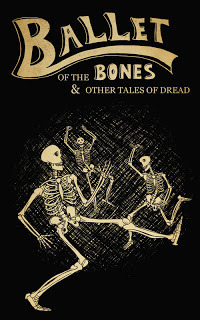

As for the tales themselves, well, I may very well do a review soon (and also of his new novella, Seance of the Souls), but in the meantime I hope Mr Haynes would not mind me reproducing the blurb he has provided on his website:
Ballet of the Bones
Four short tales of Victorian terror, each bound to the other by a chilling thread. London suffocates under the festering reek of its bursting graveyards.
Ballet of the Bones: The curtain goes up on the greatest show on earth, but is everything all it seems?
The Bone House: The grave digger reflects on his morbid life, but what does his future hold?
The Engineer: His creations are beautiful, intricate and for a discerning palate.
Encore: The director makes ready for the end of the show.
Mask of the Macabre
Four short tales of Victorian terror, each bound to the other by a chilling thread. The date is January 10th 1866 and the snow is falling thick on the blood soaked streets of a murderous London…
Mask of The Macabre: A travelling magician appears with a gruesome show. But what secret does it hide?
Doctor Harvey: Bethlem lunatic asylum’s newest patient has a story to tell, but how will he tell it to his doctor?
Memento Mori: A photographer is given a mysterious assignment with disturbing consequences.
The New Costume: The entertainer discovers a new string to his bow and gives the finest performance of his career.
Firstly I must say I was tempted to try them due to their excellent, quirky covers. As a graphic designer myself, I appreciate the visual side of the equation when it comes to publishing, and these really stand out. Not only are they that bit different, but they suit very well the content and style of the books.


As for the tales themselves, well, I may very well do a review soon (and also of his new novella, Seance of the Souls), but in the meantime I hope Mr Haynes would not mind me reproducing the blurb he has provided on his website:
Ballet of the Bones
Four short tales of Victorian terror, each bound to the other by a chilling thread. London suffocates under the festering reek of its bursting graveyards.
Ballet of the Bones: The curtain goes up on the greatest show on earth, but is everything all it seems?
The Bone House: The grave digger reflects on his morbid life, but what does his future hold?
The Engineer: His creations are beautiful, intricate and for a discerning palate.
Encore: The director makes ready for the end of the show.
Mask of the Macabre
Four short tales of Victorian terror, each bound to the other by a chilling thread. The date is January 10th 1866 and the snow is falling thick on the blood soaked streets of a murderous London…
Mask of The Macabre: A travelling magician appears with a gruesome show. But what secret does it hide?
Doctor Harvey: Bethlem lunatic asylum’s newest patient has a story to tell, but how will he tell it to his doctor?
Memento Mori: A photographer is given a mysterious assignment with disturbing consequences.
The New Costume: The entertainer discovers a new string to his bow and gives the finest performance of his career.
Published on May 17, 2013 23:10
May 5, 2013
Childhood influences and burial sites
One of the main influences for my writing thus far has been my childhood. I recently had the opportunity to revisit the playgrounds of my youth; and, perhaps inevitably, I was taken aback by how different they seemed. I set out for a run from my childhood home, across the playing fields and through the Spinney I wrote about in
The Source of the Lea
and Abraham's Bosom, and on to the Marsh House playgrounds. There used to be an enormous children's adventure area styled after a fort, which was impossibly exciting to me as a child, and now it has become a BMX track. Marsh House still stands alongside, but it's a sad sight now, doors and windows boarded or bricked up. I recall when the side of the building was first painted in bright colours, back in 1978, when it was transformed into a youth centre. At that time there was a go-kart track there, on some old tennis courts, delineated by piles of car tyres. It was a mecca for youngsters back then, but now it is mainly deserted. It occurred to me that there could be some inspiration for a story here, so I thought I'd take some photos.
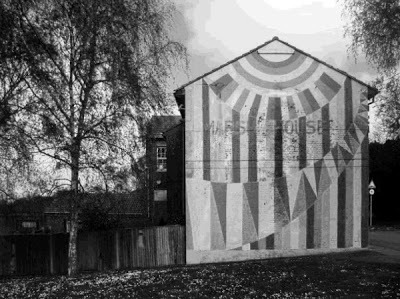 This is the painted side of Marsh House, which now looks to be deserted and boarded up
This is the painted side of Marsh House, which now looks to be deserted and boarded up
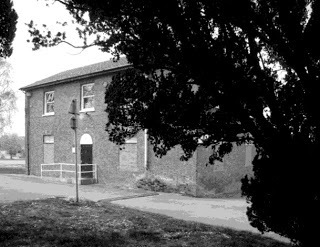 The front of Marsh House
The front of Marsh House
 All the ground floor windows are either boarded or bricked up.
All the ground floor windows are either boarded or bricked up.
I wonder what's insideThis made me think about creepy stories suggesting childhood memories, of which there must be quite a few. Two such tales by Aickman spring to mind, The Same Dog and The Inner Room. The interesting thing to me about using a child (or a younger version of the writer) as the main protagonist is that misunderstandings can be created; the child's view of things can be unreliable, which adds to the mystery. One of my favourite stories along these lines must be The Shelter by James Everington. This is a particularly evocative tale of the vagaries involved in the formative years. The Boy in Green Velvet or Come into My Parlour by Reggie Oliver might fit the bill too.
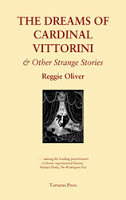
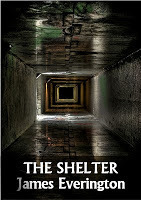
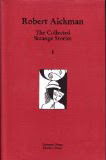
While I was wandering around reminiscing, I was reminded that the surrounding area, Waulud's Bank, is named after a neolithic burial site. A D-shaped enclosure, it takes the form of a grassy bank through the surrounding woods, down which we used to run, roll, cycle, toboggan ... depending on the weather. I've since found out that a major ley line runs through the middle of the site, stretching from Cornwall to Yarmouth; it also bisects the Avebury stone circles. Apparently there would once have been stones at Waulud's Bank too, but they have long since disappeared. We used to find arrow heads, bits of pottery and so on in the chalky soil there, but we thought nothing of it. In recent years, many very significant finds have taken place there, but with almost no publicity. I could only find one scruffy old sign mentioning anything about it; but I'm sure more people would be interested if the history was more widely known.
I'm also sure there's a story in there somewhere ... History can make for a compelling tale, adding a convincing background to a good story, particularly when ghosts are involved. For proof, have a look at the excellent blog Freaky folk tales, for some evocative MR James-esque delights.
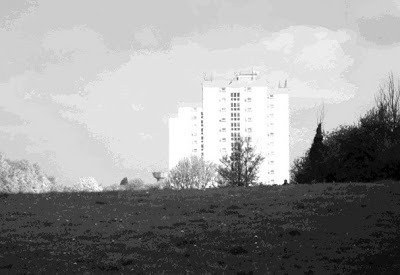 Part of the ancient Waulud's Bank in the foreground, and the three blocks
Part of the ancient Waulud's Bank in the foreground, and the three blocks
of flats over the hill. Five Springs is the closer of them The only sign I could find with details of this fascinating area
The only sign I could find with details of this fascinating area
 This is the painted side of Marsh House, which now looks to be deserted and boarded up
This is the painted side of Marsh House, which now looks to be deserted and boarded up
 The front of Marsh House
The front of Marsh House
 All the ground floor windows are either boarded or bricked up.
All the ground floor windows are either boarded or bricked up. I wonder what's insideThis made me think about creepy stories suggesting childhood memories, of which there must be quite a few. Two such tales by Aickman spring to mind, The Same Dog and The Inner Room. The interesting thing to me about using a child (or a younger version of the writer) as the main protagonist is that misunderstandings can be created; the child's view of things can be unreliable, which adds to the mystery. One of my favourite stories along these lines must be The Shelter by James Everington. This is a particularly evocative tale of the vagaries involved in the formative years. The Boy in Green Velvet or Come into My Parlour by Reggie Oliver might fit the bill too.



While I was wandering around reminiscing, I was reminded that the surrounding area, Waulud's Bank, is named after a neolithic burial site. A D-shaped enclosure, it takes the form of a grassy bank through the surrounding woods, down which we used to run, roll, cycle, toboggan ... depending on the weather. I've since found out that a major ley line runs through the middle of the site, stretching from Cornwall to Yarmouth; it also bisects the Avebury stone circles. Apparently there would once have been stones at Waulud's Bank too, but they have long since disappeared. We used to find arrow heads, bits of pottery and so on in the chalky soil there, but we thought nothing of it. In recent years, many very significant finds have taken place there, but with almost no publicity. I could only find one scruffy old sign mentioning anything about it; but I'm sure more people would be interested if the history was more widely known.
I'm also sure there's a story in there somewhere ... History can make for a compelling tale, adding a convincing background to a good story, particularly when ghosts are involved. For proof, have a look at the excellent blog Freaky folk tales, for some evocative MR James-esque delights.
 Part of the ancient Waulud's Bank in the foreground, and the three blocks
Part of the ancient Waulud's Bank in the foreground, and the three blocks of flats over the hill. Five Springs is the closer of them
 The only sign I could find with details of this fascinating area
The only sign I could find with details of this fascinating area
Published on May 05, 2013 14:34
May 3, 2013
Hitcher and Those bastards in their mansions
I have posted a couple of very well known Simon Armitage poems today; Hitcher and Those bastards in their mansions (both from Book of Matches). Not ghostly, but certainly horrific in a mundane, matter-of-fact way; which is something I strive to achieve in my writing.
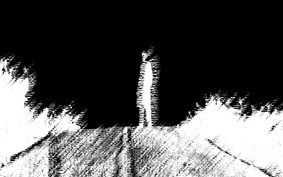
Hitcher must be Armitage's most famous poem. It is simple yet ambiguous; is it a straightforward monologue, or is the speaker remembering himself as he was before being enslaved into working life? The casual violence of it is shockingly effective.
Hitcher by Simon Armitage
I'd been tired, under
the weather, but the ansaphone kept screaming.
One more sick-note, mister, and you're finished. Fired.
I thumbed a lift to where the car was parked.
A Vauxhall Astra. It was hired.
I picked him up in Leeds.
He was following the sun to west from east
with just a toothbrush and the good earth for a bed. The truth,
he said, was blowin' in the wind,
or round the next bend.
I let him have it
on the top road out of Harrogate – once
with the head, then six times with the krooklok
in the face – and didn't even swerve.
I dropped it into third
and leant across
to let him out, and saw him in the mirror
bouncing off the kerb, then disappearing down the verge.
We were the same age, give or take a week.
He'd said he liked the breeze
to run its fingers
through his hair. It was twelve noon.
The outlook for the day was moderate to fair.
Stitch that, I remember thinking,
you can walk from there.
Those bastards in their mansions could be seen as a powerful call to arms for the populace. It would seem that the privileged should not persist with complacency; instead they should look out for one who sticks to shadows and carries a gun!
Those bastards in their mansions by Simon Armitage
Those bastards in their mansions:
to hear them shriek, you'd think
I'd poisoned the dogs and vaulted the ditches,
crossed the lawns in stocking feet and threadbare britches,
forced the door of one of the porches, and lifted
the gift of fire from the burning torches,
then given heat and light to streets and houses,
told the people how to ditch their cuffs and shackles,
armed them with the iron from their wrists and ankles.
Those lords and ladies in their palaces and castles,
they'd have me sniffed out by their beagles,
picked at by their eagles, pinned down, grilled
beneath the sun,
Me, I stick to the shadows, carry a gun

Hitcher must be Armitage's most famous poem. It is simple yet ambiguous; is it a straightforward monologue, or is the speaker remembering himself as he was before being enslaved into working life? The casual violence of it is shockingly effective.
Hitcher by Simon Armitage
I'd been tired, under
the weather, but the ansaphone kept screaming.
One more sick-note, mister, and you're finished. Fired.
I thumbed a lift to where the car was parked.
A Vauxhall Astra. It was hired.
I picked him up in Leeds.
He was following the sun to west from east
with just a toothbrush and the good earth for a bed. The truth,
he said, was blowin' in the wind,
or round the next bend.
I let him have it
on the top road out of Harrogate – once
with the head, then six times with the krooklok
in the face – and didn't even swerve.
I dropped it into third
and leant across
to let him out, and saw him in the mirror
bouncing off the kerb, then disappearing down the verge.
We were the same age, give or take a week.
He'd said he liked the breeze
to run its fingers
through his hair. It was twelve noon.
The outlook for the day was moderate to fair.
Stitch that, I remember thinking,
you can walk from there.
Those bastards in their mansions could be seen as a powerful call to arms for the populace. It would seem that the privileged should not persist with complacency; instead they should look out for one who sticks to shadows and carries a gun!
Those bastards in their mansions by Simon Armitage
Those bastards in their mansions:
to hear them shriek, you'd think
I'd poisoned the dogs and vaulted the ditches,
crossed the lawns in stocking feet and threadbare britches,
forced the door of one of the porches, and lifted
the gift of fire from the burning torches,
then given heat and light to streets and houses,
told the people how to ditch their cuffs and shackles,
armed them with the iron from their wrists and ankles.
Those lords and ladies in their palaces and castles,
they'd have me sniffed out by their beagles,
picked at by their eagles, pinned down, grilled
beneath the sun,
Me, I stick to the shadows, carry a gun
Published on May 03, 2013 01:17
April 25, 2013
Our Little Ghost and The Telegraph Operator
The first of my spooky poems today is Our Little Ghost by Louisa May Alcott. She was better known for her novel Little Women (1865) which was one of the first novels of the Literary Realism movement, and she was an active feminist. Our Little Ghost is a very sad poem, but it reflects the fact that in the mid-nineteenth century around half of the children from poor families died in childhood ... so there were many Little Ghosts.
Our Little Ghost
Louisa May Alcott
Oft in the silence of the night,
When the lonely moon rides high,
When wintry winds are whistling,
And we hear the owl's shrill cry,
In the quiet, dusky chamber,
By the flickering firelight,
Rising up between two sleepers,
Comes a spirit all in white.
A winsome little ghost it is,
Rosy-cheeked, and bright of eye;
With yellow curls all breaking loose
From the small cap pushed awry.
Up it climbs among the pillows,
For the 'big dark' brings no dread,
And a baby's boundless fancy
Makes a kingdom of a bed.
A fearless little ghost it is;
Safe the night seems as the day;
The moon is but a gentle face,
And the sighing winds are gay.
The solitude is full of friends,
And the hour brings no regrets;
For, in this happy little soul,
Shines a sun that never sets.
A merry little ghost it is,
Dancing gayly by itself,
On the flowery counterpane,
Like a tricksy household elf;
Nodding to the fitful shadows,
As they flicker on the wall;
Talking to familiar pictures,
Mimicking the owl's shrill call.
A thoughtful little ghost if is;
And, when lonely gambols tire,
With chubby hands on chubby knees,
It sits winking at the fire.
Fancies innocent and lovely
Shine before those baby-eyes,
Endless fields of dandelions,
Brooks, and birds, and butterflies.
A loving little ghost it is:
When crept into its nest,
Its hand on father's shoulder laid,
Its head on mother's breast,
It watches each familiar face,
With a tranquil, trusting eye;
And, like a sleepy little bird,
Sings its own soft lullaby.
Then those who feigned to sleep before,
Lest baby play till dawn,
Wake and watch their folded flower
Little rose without a thorn.
And, in the silence of the night,
The hearts that love it most
Pray tenderly above its sleep,
'God bless our little ghost!'
Next we have a change of pace, and Robert W. Service's The Telegraph Operator, an atmospheric piece about loneliness with I think something of the taste of The Signalman by Dickens.
The Telegraph Operator
Robert W. Service
I will not wash my face; I will not brush my hair; I "pig" around the place — There's nobody to care. Nothing but rock and tree; Nothing but wood and stone; Oh God, it's hell to be Alone, alone, alone.
Snow-peaks and deep-gashed draws Corral me in a ring. I feel as if I was The only living thing On all this blighted earth; And so I frowst and shrink, And crouching by my hearth, I hear the thoughts I think.
I think of all I miss — The boys I used to know; The girls I used to kiss; The coin I used to blow: The bars I used to haunt; The racket and the row; The beers I didn't want (I wish I had 'em now).
Day after day the same, Only a little worse; No one to grouch or blame — Oh, for a loving curse! Oh, in the night I fear, Haunted by nameless things, Just for a voice to cheer, Just for a hand that clings!
Faintly as from a star Voices come o'er the line; Voices of ghosts afar, Not in this world of mine. Lives in whose loom I grope; Words in whose weft I hear Eager the thrill of hope, Awful the chill of fear.
I'm thinking out aloud; I reckon that is bad; (The snow is like a shroud) — Maybe I'm going mad. Say! wouldn't that be tough? This awful hush that hugs And chokes one is enough To make a man go "bugs".
There's not a thing to do; I cannot sleep at night; No wonder I'm so blue; Oh, for a friendly fight! The din and rush of strife; A music-hall aglow; A crowd, a city, life — Dear God, I miss it so!
Here, you have moped enough! Brace up and play the game! But say, it's awful tough — Day after day the same (I've said that twice, I bet). Well, there's not much to say. I wish I had a pet, Or something I could play.
Cheer up! don't get so glum And sick of everything; The worst is yet to come; God help you till the Spring. God shield you from the Fear; Teach you to laugh, not moan. Ha! ha! it sounds so queer — Alone, alone, alone.
Our Little Ghost
Louisa May Alcott
Oft in the silence of the night,
When the lonely moon rides high,
When wintry winds are whistling,
And we hear the owl's shrill cry,
In the quiet, dusky chamber,
By the flickering firelight,
Rising up between two sleepers,
Comes a spirit all in white.
A winsome little ghost it is,
Rosy-cheeked, and bright of eye;
With yellow curls all breaking loose
From the small cap pushed awry.
Up it climbs among the pillows,
For the 'big dark' brings no dread,
And a baby's boundless fancy
Makes a kingdom of a bed.
A fearless little ghost it is;
Safe the night seems as the day;
The moon is but a gentle face,
And the sighing winds are gay.
The solitude is full of friends,
And the hour brings no regrets;
For, in this happy little soul,
Shines a sun that never sets.
A merry little ghost it is,
Dancing gayly by itself,
On the flowery counterpane,
Like a tricksy household elf;
Nodding to the fitful shadows,
As they flicker on the wall;
Talking to familiar pictures,
Mimicking the owl's shrill call.
A thoughtful little ghost if is;
And, when lonely gambols tire,
With chubby hands on chubby knees,
It sits winking at the fire.
Fancies innocent and lovely
Shine before those baby-eyes,
Endless fields of dandelions,
Brooks, and birds, and butterflies.
A loving little ghost it is:
When crept into its nest,
Its hand on father's shoulder laid,
Its head on mother's breast,
It watches each familiar face,
With a tranquil, trusting eye;
And, like a sleepy little bird,
Sings its own soft lullaby.
Then those who feigned to sleep before,
Lest baby play till dawn,
Wake and watch their folded flower
Little rose without a thorn.
And, in the silence of the night,
The hearts that love it most
Pray tenderly above its sleep,
'God bless our little ghost!'
Next we have a change of pace, and Robert W. Service's The Telegraph Operator, an atmospheric piece about loneliness with I think something of the taste of The Signalman by Dickens.
The Telegraph Operator
Robert W. Service
I will not wash my face; I will not brush my hair; I "pig" around the place — There's nobody to care. Nothing but rock and tree; Nothing but wood and stone; Oh God, it's hell to be Alone, alone, alone.
Snow-peaks and deep-gashed draws Corral me in a ring. I feel as if I was The only living thing On all this blighted earth; And so I frowst and shrink, And crouching by my hearth, I hear the thoughts I think.
I think of all I miss — The boys I used to know; The girls I used to kiss; The coin I used to blow: The bars I used to haunt; The racket and the row; The beers I didn't want (I wish I had 'em now).
Day after day the same, Only a little worse; No one to grouch or blame — Oh, for a loving curse! Oh, in the night I fear, Haunted by nameless things, Just for a voice to cheer, Just for a hand that clings!
Faintly as from a star Voices come o'er the line; Voices of ghosts afar, Not in this world of mine. Lives in whose loom I grope; Words in whose weft I hear Eager the thrill of hope, Awful the chill of fear.
I'm thinking out aloud; I reckon that is bad; (The snow is like a shroud) — Maybe I'm going mad. Say! wouldn't that be tough? This awful hush that hugs And chokes one is enough To make a man go "bugs".
There's not a thing to do; I cannot sleep at night; No wonder I'm so blue; Oh, for a friendly fight! The din and rush of strife; A music-hall aglow; A crowd, a city, life — Dear God, I miss it so!
Here, you have moped enough! Brace up and play the game! But say, it's awful tough — Day after day the same (I've said that twice, I bet). Well, there's not much to say. I wish I had a pet, Or something I could play.
Cheer up! don't get so glum And sick of everything; The worst is yet to come; God help you till the Spring. God shield you from the Fear; Teach you to laugh, not moan. Ha! ha! it sounds so queer — Alone, alone, alone.
Published on April 25, 2013 16:06
April 12, 2013
Darker Times Vol 3 and a review

My short story Abraham's Bosom is now available in the Darker Times Anthology Vol 3. E-book now, and paperback soon. Details here:
http://www.amazon.co.uk/Darker-Times-Anthology-Volume-ebook/dp/B00CBNQOPO/ref=sr_1_3?s=digital-text&ie=UTF8&qid=1365752999&sr=1-3&keywords=darker+times+anthology
Or in the US:
http://www.amazon.com/Darker-Times-Anthology-Volume-ebook/dp/B00CBNQOPO/ref=sr_1_3?ie=UTF8&qid=1365753031&sr=8-3&keywords=darker+times+anthology

Review of Love and Loyalty by Maria Savva
My preferred form of writing is the short story, but usually of the darker kind; so I did not know what to expect of Maria Savva's collection, Love and Loyalty. I was pleased to find myself hooked from the beginning of the first story, The Artist. Jane is trying to talk the artist, Franco, out of suicide; but has she already missed her chance? She begins to doubt herself, and indeed her own sense of reality. This is a good introduction to the book, introducing Savva's careful characterisations and story telling skills. One Thing Leads to Another is a cautionary tale of the damaging domino effects possible by being just a bit too true to yourself. This is followed by I'm Only Doing My Job, which attempts to explain the strange behaviour of some traffic wardens...
Mannequin shapes like it could easily be a supernatural tale, then changes its direction abruptly, which quite caught me out. Friendship is the key! The same could be said of My Darkest Day, which manipulates mood to good effect. I never knew what 'atychiphobia' meant, but after this story of the same name, I'm unlikely to forget. I'm sure Vivienne would either have known, or would at least look it up straight away! She is the kind of character who always gets her comeuppance... but does she? As with most of these stories, you'll be left thinking. The Perfect Life deals with misunderstanding and deception in the workplace, and will surprise you at its conclusion.
Perhaps my favourite is Ordinary Lives, which is another cautionary tale involving the intellectual property of a novel... just when can it be claimed as one's own? Friendships are at stake. This story unfolded gradually, and surely every aspiring writer could relate to it. The collection ends strongly with Speed King, plotting the gradual divergence of an older couple, via fast cars and the internet, and finally Out of the cauldron, Into the Fire, which will discourage you from crying wolf once and for all.
I enjoyed these carefully plotted stories with their contemporary settings, thoughtful endings and realistic characters. I am looking forward to Maria Savva's next collection.
Published on April 12, 2013 02:25
April 3, 2013
Acquainted With the Night
A few more of my favourite poems for your enjoyment today. I have been busy editing and re-writing stories for my upcoming collection, (probably) called Dying Embers. It's still some way off, and it means I don't have so much time for the blog right now.
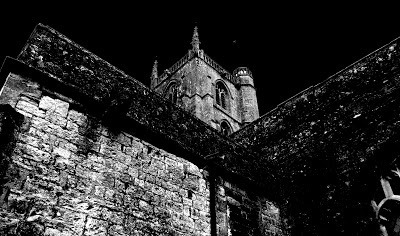
Acquainted With The Night is one of Robert Frost's lesser-known poems, but it has an elegance and simplicity that appeals to me; and a certain mystery. What exactly does 'I have been one acquainted with the night' mean?
Acquainted With The Night
by Robert Frost
I have been one acquainted with the night.
I have walked out in rain—and back in rain.
I have outwalked the furthest city light.
I have looked down the saddest city lane.
I have passed by the watchman on his beat
And dropped my eyes, unwilling to explain.
I have stood still and stopped the sound of feet
When far away an interrupted cry
Came over houses from another street,
But not to call me back or say good-by;
And further still at an unearthly height,
One luminary clock against the sky
Proclaimed the time was neither wrong nor right.
I have been one acquainted with the night.
Resumé is Dorothy Parker's best-known poem, and it is rather brittle, perhaps in a similar style to her short stories. It's light-hearted on the surface, but conceals an undercurrent of darkness.
Resumé
by Dorothy Parker
Razors pain you;
Rivers are damp;
Acids stain you;
And drugs cause cramp.
Guns aren't lawful;
Nooses give;
Gas smells awful;
You might as well live.
Finally, Ozymandias by Shelley, surely one of the most powerful and influential of sonnets. It's interesting how the words of the poet have long outlasted the monument he wrote about (although Shelley apparently never saw the statue of Rameses II – aka Ozymandias) as it does not survive.
Ozymandias
by Percy Bysshe Shelley
I met a traveller from an antique land
Who said: Two vast and trunkless legs of stone
Stand in the desert. Near them, on the sand,
Half sunk, a shattered visage lies, whose frown,
And wrinkled lip, and sneer of cold command,
Tell that its sculptor well those passions read
Which yet survive, stamped on these lifeless things,
The hand that mocked them, and the heart that fed;
And on the pedestal these words appear:
"My name is Ozymandias, king of kings:
Look on my works, ye Mighty, and despair!"
Nothing beside remains. Round the decay
Of that colossal wreck, boundless and bare
The lone and level sands stretch far away.

Acquainted With The Night is one of Robert Frost's lesser-known poems, but it has an elegance and simplicity that appeals to me; and a certain mystery. What exactly does 'I have been one acquainted with the night' mean?
Acquainted With The Night
by Robert Frost
I have been one acquainted with the night.
I have walked out in rain—and back in rain.
I have outwalked the furthest city light.
I have looked down the saddest city lane.
I have passed by the watchman on his beat
And dropped my eyes, unwilling to explain.
I have stood still and stopped the sound of feet
When far away an interrupted cry
Came over houses from another street,
But not to call me back or say good-by;
And further still at an unearthly height,
One luminary clock against the sky
Proclaimed the time was neither wrong nor right.
I have been one acquainted with the night.
Resumé is Dorothy Parker's best-known poem, and it is rather brittle, perhaps in a similar style to her short stories. It's light-hearted on the surface, but conceals an undercurrent of darkness.
Resumé
by Dorothy Parker
Razors pain you;
Rivers are damp;
Acids stain you;
And drugs cause cramp.
Guns aren't lawful;
Nooses give;
Gas smells awful;
You might as well live.
Finally, Ozymandias by Shelley, surely one of the most powerful and influential of sonnets. It's interesting how the words of the poet have long outlasted the monument he wrote about (although Shelley apparently never saw the statue of Rameses II – aka Ozymandias) as it does not survive.
Ozymandias
by Percy Bysshe Shelley
I met a traveller from an antique land
Who said: Two vast and trunkless legs of stone
Stand in the desert. Near them, on the sand,
Half sunk, a shattered visage lies, whose frown,
And wrinkled lip, and sneer of cold command,
Tell that its sculptor well those passions read
Which yet survive, stamped on these lifeless things,
The hand that mocked them, and the heart that fed;
And on the pedestal these words appear:
"My name is Ozymandias, king of kings:
Look on my works, ye Mighty, and despair!"
Nothing beside remains. Round the decay
Of that colossal wreck, boundless and bare
The lone and level sands stretch far away.
Published on April 03, 2013 04:15



